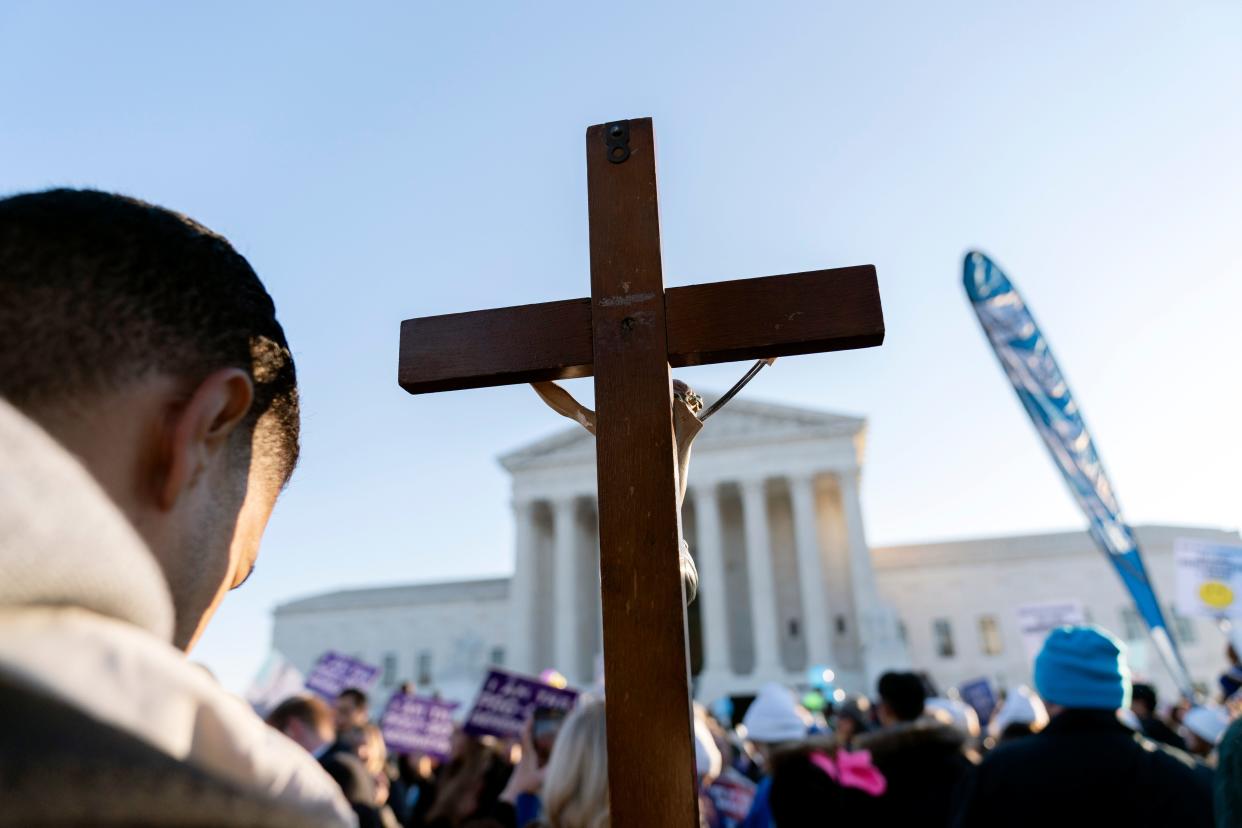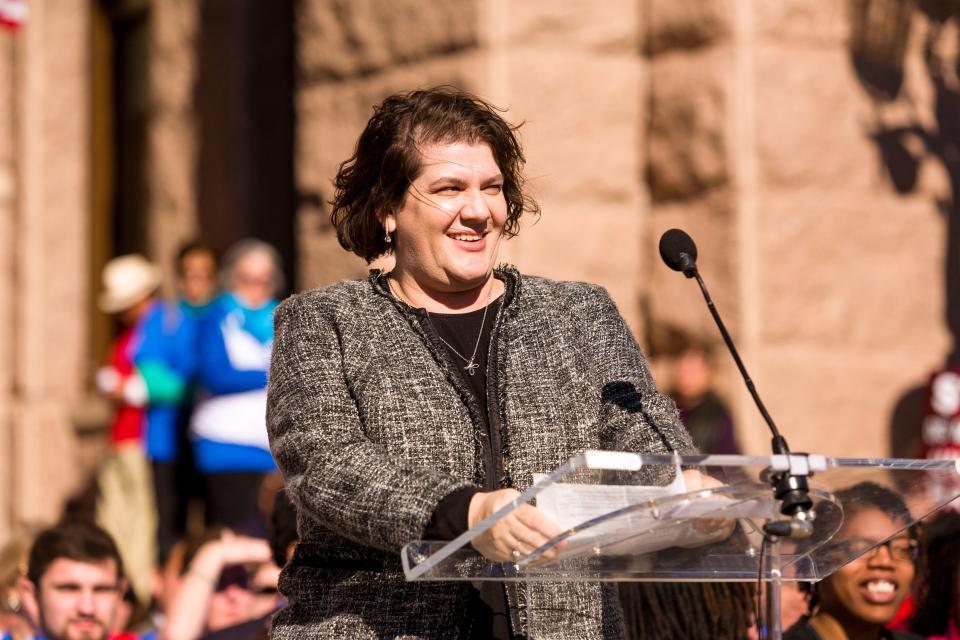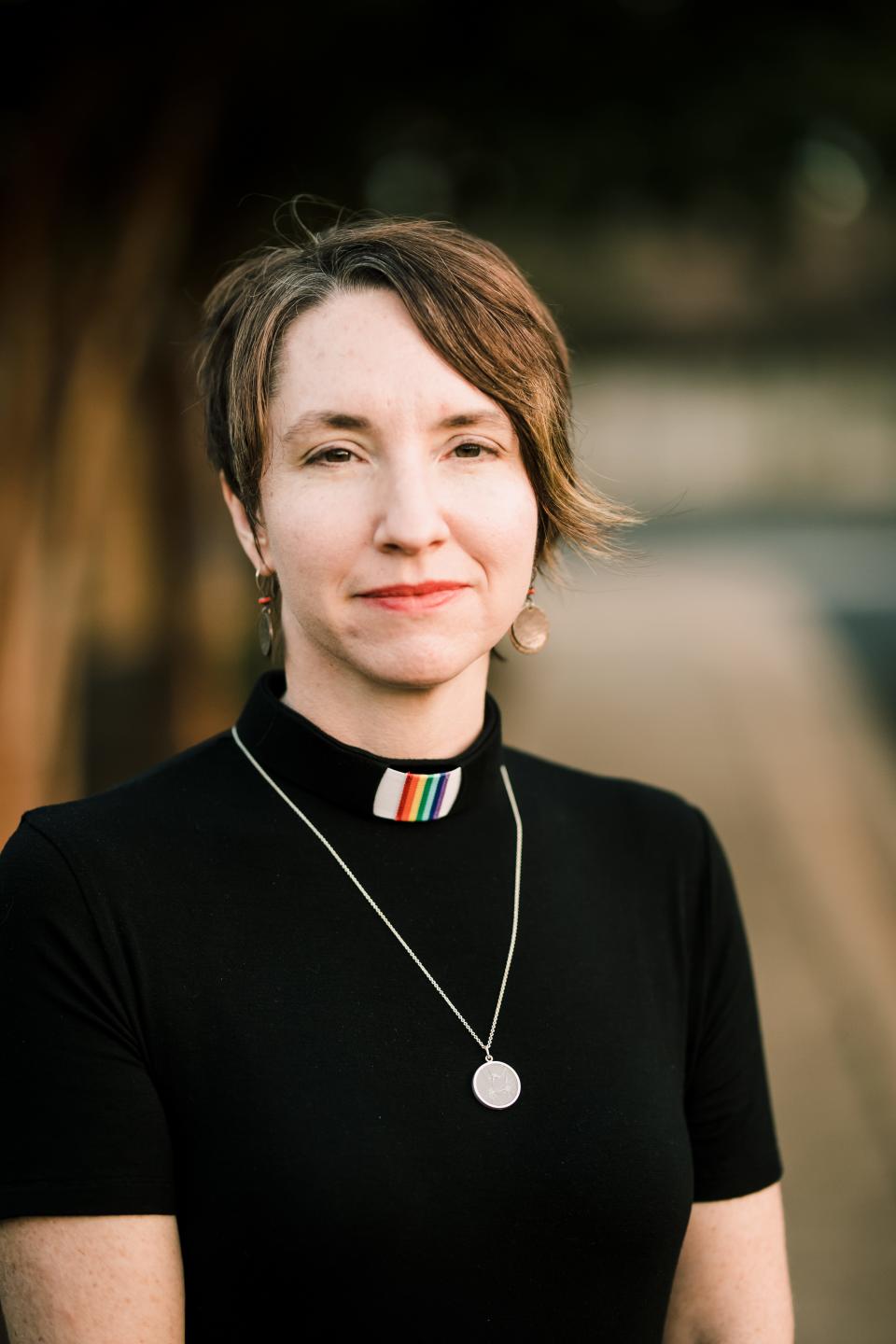Faith as weapon or salvation? How religion animates the Texas abortion debate.

With the end of Roe v. Wade seemingly on the horizon, conservative Christians who have fought to end abortion access for decades are cautiously hopeful and optimistic — but the issue also divides the faith community, as other people who identify as religious condemn the elimination of federal abortion rights protection.
The battle over abortion rights fundamentally shifted Monday after Politico released a draft U.S. Supreme Court opinion that indicates a majority of justices are poised to overturn Roe v. Wade, the landmark 1973 case that established a federal right to abortion.
The court has yet to issue a final ruling on the issue, which is expected to be released midsummer.
A ruling overturning Roe v. Wade would almost immediately make abortion illegal in Texas, which is one of many states that has passed a so-called trigger law banning abortion 30 days after the U.S. Supreme Court outlaws the procedure.
More: Abortion would be illegal in Texas if the Supreme Court overturns Roe v. Wade
It would be a monumental win for anti-abortion advocates, the majority of whom are Christian and say they oppose the procedure due to their faith. But abortion rights proponents, many of whom identify as Christian, are speaking up and saying the conservative Christians who have driven the anti-abortion movement are not representative of the entire Christian community.
Leaders of other faith communities, including Jewish rabbis, argue that reproductive justice is a fundamental aspect of their religious practice, and the end of Roe v. Wade is an unjust imposition of others’ religious beliefs.
'God loves life'
For 69-year-old Al Magness, the news of the pending end to Roe v. Wade is what he has for decades been hoping for.
“It’s not been something that I've stopped praying for since I became aware of abortion that is killing so many precious babies in our world today,” said Magness. “I’m a strong believer in life and I really believe that babies are people from the moment of conception. … I think I see that all over the pages of Scripture. God loves life, he loves life to the point that he would sacrifice his own son to give others the opportunity of having a quality of life they could not have otherwise.”
It’s a topic he said is incredibly close to his heart and faith, and often comes up in the sermons he gives in front of his congregation at Anderson Mill Baptist Church in Austin, where he serves as a preacher.
He is also on the board of the Agape Pregnancy Center in Round Rock, which aims to influence pregnant people to decide against having an abortion, and provides resources for them. He said his work there, as well as his time spent praying in front of facilities that provide abortions, is gratifying because it allows him to be on the “cutting edge of life.”
“My position has grown with more passion over the years because I see the urgency of being there to talk to people,” Magness said. “It's a fresh opportunity. One person at a time, one baby at a time, we're going to make our stand. We're meeting the people that are coming in, not to be forced into a religious decision, that's not what we do at all, but we are giving them some options that help them to choose life for their baby instead of death.”
In addition to his ministry, he’s also been politically active in his advocacy against abortion, saying the issue is top of mind for him when he enters the voting booth.
“I’ve never missed a vote since I’ve lived here in Austin. I’m very active in the voting process, and I try to do my homework on all the candidates that I feel like the Lord would be pleased for me to support and to vote for, so it’s both a personal thing and a very public thing,” Magness said.
'My generation will end abortion'
For Jennifer Allmon, working to eliminate access to abortion is not only a personal and public endeavor, but also a professional one. She’s the executive director of the Texas Catholic Conference of Bishops, and she says in her entire 16 years working there, the goal has been to achieve incremental reductions in abortion access.
“Catholics have been working and praying for the day that Roe is overturned for more than 50 years,” said Allmon. “So obviously, a leaked draft gives us some hope. But we will continue our prayer for that day, and, more importantly, we will continue to serve families in need.”

“We've always talked about the day when we end Roe, and to be present and engaged and actively involved in the passage of the trigger ban that will be the real key to ending Roe in Texas is unreal. I mean, it's difficult to put into words what that feels like. ... We always said my generation will end abortion, but now that's becoming true. And that’s overwhelming.”
The feeling is shared by many in the anti-abortion movement, including Mary Elizabeth Castle, a senior policy director of Texas Values, a conservative Christian advocacy group that was instrumental in advocating for the passage of the state’s six-week abortion ban and the trigger law.
“It feels very exciting and very heartwarming to know that, hopefully, as we're seeing this overturning of a 50-year precedent of having such a severe view on pre-born babies, that we can now view human life as something that is sacred,” Castle said. “I'm hoping opinions and minds will begin to change even after the law changes, and that we start to see the pre-born child as something precious and that we also start to see the family as something precious as well and that we become a nation and even a world that lifts up mothers and babies.”
'Bodily autonomy is holy'
The Rev. Amelia Fulbright, pastor of the Congregational Church of Austin near the University of Texas, said a ruling to overturn Roe v. Wade would set back gender equity by at least 50 years. As a faith leader, Fulbright has been an outspoken about her support for abortion rights and access, which she says is partially due to her upbringing in the Southern Baptist church.
“The pro-life message that I heard in churches in my childhood, I saw it as really kind of oppressive of women,” Fulbright said. “I do think that if we are fully human, then we ought to have autonomy over our own bodies as men do. … I also think the Christian theology and the Bible have been distorted in this contemporary pro-life movement, and I really feel an obligation to stand up against that.”

She says that the messaging from anti-abortion Christian groups is far from representative of the entire faith community.
“I am really, really concerned about the way that this issue of abortion has been framed by a certain actually relatively small group of Christians who have become the loudest voices in our culture, and are trying to encode their particular belief system into law for everyone else,” Fulbright said.
The Rev. Remington Olivia Johnson, a pastor in the Presbyterian Church who is also a transgender woman based in Austin, shares Fulbright’s concern.
“People's bodily autonomy is holy. It's divine. There's something sacred about recognizing that we as people have choices, that we control our bodies, and how we get to navigate in the world,” Johnson said.
Johnson is affiliated with Just Texas, an organization that defines itself as a “grassroots movement of progressive people of faith and faith leaders” that supports reproductive freedom and LGBTQ rights. The organization is part of the Texas Freedom Network, a civil rights nonprofit founded by Cecile Richards.
As part of its grassroots effort, Just Texas runs the "Reproductive Freedom Congregation" initiative, which registers churches as supportive of reproductive rights and LGBTQ equality.
Last September, when Senate Bill 8, the state’s six-week abortion ban, went into effect, Fulbright led the effort to put the Congregational Church of Austin through the process of earning the "Reproductive Freedom Congregation" designation.
“The church really felt like, you know, the time is now,” Fulbright said. “We feel that affirming the principles of reproductive justice is all a part of our own work in the community for racial justice and economic justice, because one thing we know about abortions, and about laws that really seek to put an end to legal abortion, is that they disproportionately affect low-income women and people of color.”
More: Black, Latino, low-income Texans to be hardest hit if Roe v. Wade overturned, experts say
Both Johnson and Fulbright say the end of legal abortion in Texas will not put an end to all abortions in Texas, just medically safe abortions.
“The lives of birthing people will be put in danger because of autocratic rule, because of theology masquerading as medical advice, medical policy. It's abhorrent,” Johnson said.
More: Abortion Rights Protest in Austin following leaked draft that would overturn Roe v. Wade
'They do not have the right to tell me that my religion is wrong'
In the eyes of Rabbi Kelly Levy of the Congregation Beth Israel in Austin, the end of Roe v. Wade is about more than just reproductive rights — it’s an issue of religious freedom.
“In the Christian world, life begins at conception. In the Jewish world, we define life as beginning at first breath, at first viable breath. And that means that we do not actually view abortion as what the anti-abortion movement calls murder, we view it as a medical necessity,” Levy said. “It is absolutely going against my religious freedoms, to use faith, especially the Christian faith, as a reason to stop abortion. They are preventing me from practicing my religion, and those of us who are Jews from practicing our religion.”
Levy argues that the concept of reproductive justice is actually baked into the foundations of Judaism, and that the impending end of Roe v. Wade has caused widespread distress in her community.
“My congregation is as distraught as I am,” Levy said. “For far too long, the anti-abortion movement has used their faith as a weapon to delegitimize and criminalize a medical procedure that we as Jews and faithful people have every right to obtain should we require it, and they do not have the right to tell me that my religion is wrong. Because our country was founded on the right to our own religious beliefs and our own religious values.”
Levy said she is not optimistic for the future of abortion access in the state.
“I was unfortunately not surprised, but still extremely shocked that we are now in the year 2022 and going back to the way things were 50 years ago when people were still getting abortions, they just were not safe and they were not legal. It's disheartening. It's exhausting. It's unbelievable,” Levy said.
This article originally appeared on Austin American-Statesman: Faith communities split on potential end to Roe v Wade

